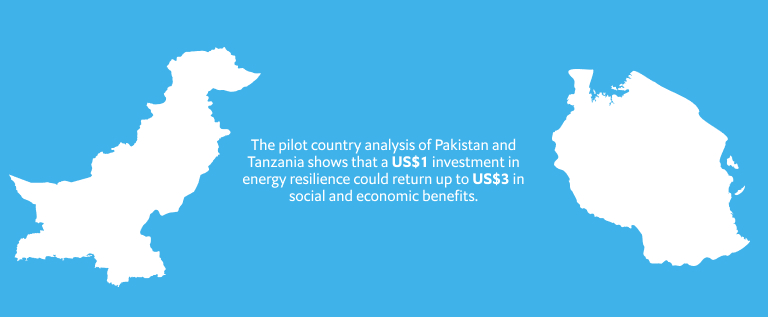Energy is crucial for delivering quality healthcare, education, and water – fundamental components for nurturing a healthy childhood and productive life. However, in 2023, about 745m people worldwide still lacked basic access to electricity. [1] This included hundreds of millions of children and some of the world’s most vulnerable communities.
The real gap in adequate electricity access is even greater, with some 3.5 billion people estimated to be living without reliable power. [3]

As the impacts of climate change intensify, energy systems are under growing pressure from extreme weather and growing demand, jeopardising the provision of essential social services. From the devastating floods in Pakistan [4] to the severe drought conditions in Chile, [5] communities in developing countries suffer the worst consequences.
Enhancing energy resilience worldwide is vital for maintaining access to essential healthcare, clean water, and quality education in adverse conditions. New cost-benefit research conducted by Economist Impact, supported by UNICEF, finds that investment in energy resilience in developing countries can deliver significant net benefits. The pilot country analysis of Pakistan and Tanzania shows that a US$1 investment in energy resilience could return up to US$3 in social and economic benefits. But what does this mean for individuals and local communities?

This means children in lower- and middle-income countries can have better quality learning environments, improved educational outcomes and higher earnings. However, nearly 200 million children still attend schools without any electricity. [6], [7]
This means millions of lives saved, particularly among children and mothers, as a result of greater availability of quality healthcare.

This means fewer people facing waterborne diseases, households saving more and farmers becoming more productive. But still, water utilities around the world, particularly in the most vulnerable countries, face power outages regularly.
The imperative is clear: investing in resilient, sustainable, and green energy for health, education, and water is an urgent priority. Traditionally, these social sectors have been driven by the public sector, but public resources alone will be insufficient. The private sector needs to play a bigger role. However, from navigating inadequate regulatory and fiscal environments [9] to overcoming perceptions of low returns, crucial obstacles deter private sector investors. [10] Mobilising private finance requires concerted efforts to overcome these obstacles. But no one stakeholder is responsible. Regulators and policymakers need to cultivate a stable policy environment to incentivise private sector investors, while partnering up with development finance institutions to offer blended finance solutions. Private sector actors should ensure that their investments include provisions for local capacity- and knowledge-building. Only with coordinated efforts involving these different groups can such barriers be meaningfully overcome.
To learn more about the full impact of investing in energy resilience in developing countries, read the newly launched report by Economist Impact, supported by UNICEF. ‘Powering progress: measuring the socioeconomic costs and benefits of investing in energy resilience for healthcare, education and water’ explores the potential benefits relative to the costs required to provide reliable energy in developing countries and identify the tangible actions targeted towards boosting private-sector engagement and investment, which are needed to make progress towards energy resilience.
Powering Up
Extreme weather events have significantly affected every continent on the planet.
To find out more check our full report below.

To find out more, visit www.unicef.org/powering-progress
References
[1] https://www.iea.org/commentaries/access-to-electricity-improves-slightly-in-2023-but-still-far-from-the-pace-needed-to-meet-sdg7; https://www.unicef.org/supply/stories/powering-childrens-futures
[3] https://energyforgrowth.org/article/3-5-billion-people-lack-reliable-power
[6] https://www.unicef.org/media/105176/file
[7] https://www.sciencedirect.com/science/article/pii/S095965260600120X
[8] https://www.who.int/publications/i/item/9789240066984
[1] https://www.iea.org/commentaries/access-to-electricity-improves-slightly-in-2023-but-still-far-from-the-pace-needed-to-meet-sdg7; https://www.unicef.org/supply/stories/powering-childrens-futures
[3] https://energyforgrowth.org/article/3-5-billion-people-lack-reliable-power
[6] https://www.unicef.org/media/105176/file
[7] https://www.sciencedirect.com/science/article/pii/S095965260600120X
[8] https://www.who.int/publications/i/item/9789240066984

